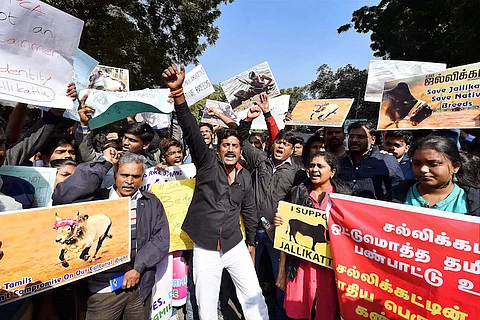

The ordinance for the conduct of jallikattu is here, and the supporters of the bull taming sport have got a temporary relief. But even as the fight for a permanent solution continues, one question on everyone’s mind is whether this ordinance will withstand the scrutiny of the courts.
This question is especially relevant since the Tamil Nadu government had brought in a law in 2009 for the regulation and conduct of the sport, which was struck down by the Supreme Court in its 2014 verdict in the jallikattu case.
So why should this ordinance be any better?
The short answer: They’ve got the assent of the President of India this time around and the PCA Act for the state of Tamil Nadu has been amended.
Let’s back up a little here. In 2009, when the Tamil Nadu government had made the Tamil Nadu Regulation of Jallikattu Act, they drew power from the State List of Schedule 7 of the Constitution. This is a list of items over which that only a state government can make laws.
The ‘Preservation, protection and improvement of stock’ comes under the state list, and therefore, Tamil Nadu was well within its right to pass such a law.
However, things changed in 2011 when the Supreme Court ordered that the bull should be added to the list of animals that cannot be used for performance purposes. And with that, the jurisdiction for making laws on jallikattu changed.
‘Prevention of Cruelty to Animals’ is an item in the Concurrent List in Schedule 7 of the Constitution, which means that both the Centre and the State will have the power to make laws on the subject.
And under normal circumstances, a Central law will prevail over a State law on the same subject.
“This was a very shrewd move, done particularly to ban jallikattu,” says Balakumar Somu, Vice Chairman, Biodiversity Conservation Council of India. “The list particularly says ‘Bull’ - and doesn’t refer to the cow, thereby clearly targeting the sport,” he added.
So when the case went back to the Supreme Court in 2014, the court declared that the Tamil Nadu Regulation of Jallikattu Act, 2009, was void.
The apex court quoted Article 254(1) of the Constitution in making this judgment.
Article 254(1): If any provision of a law made by the Legislature of a State is repugnant to any provision of a law made by Parliament which Parliament is competent to enact, or to any provision of an existing law with respect to one of the matters enumerated in the Concurrent List, then, subject to the provisions of clause (2), the law made by Parliament, whether passed before or after the law made by the Legislature of such State, or, as the case may be, the existing law, shall prevail and the law made by the Legislature of the State shall, to the extent of the repugnancy, be void.
What this means is that, subject to provisions of clause (2) of this Article, a law made by a state government on a concurrent list subject, which goes against a central government law on the same subject, will be be considered void.
And clause (2) of Article 254 says, that such a state law will beat the central government law if the President of India has given his assent to it.
Article 254(2): Where a law made by the Legislature of a State with respect to one of the matters enumerated in the concurrent List contains any provision repugnant to the provisions of an earlier law made by Parliament or an existing law with respect to that matter, then, the law so made by the Legislature of such State shall, if it has been reserved for the consideration of the President and has received his assent, prevail in that State: Provided that nothing in this clause shall prevent Parliament from enacting at any time any law with respect to the same matter including a law adding to, amending, varying or repealing the law so made by the Legislature of the State.
Since the ordinance has been promulgated after getting the assent of the President, some people believe that this time around, it will stand a better chance in the courts of law.
“As the President has given his assent, the ordinance - and the subsequent law - will prevail In case of a conflict,” says Balakumar Somu.
But many others are doubtful about whether the courts will read it as such. The protesters on the streets of Tamil Nadu are refusing to call off the protests, since they see an amendment to the PCA Act as the only permanent solution.
While the ordinance has opened the gates for jallikattu to be conducted tomorrow, many say that this is a temporary quick fix, and if they give up their protest now, the chances of the government failing them once again are very high.